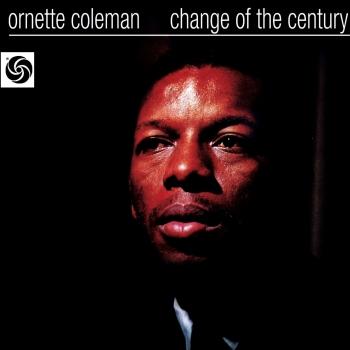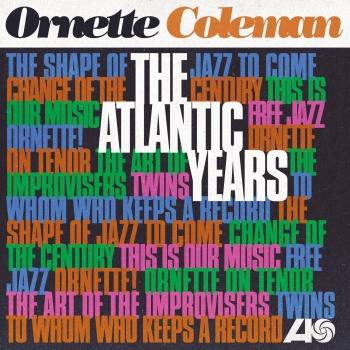
The Atlantic Years (Remastered) Ornette Coleman
Album info
Album-Release:
2018
HRA-Release:
25.05.2018
Album including Album cover
I`m sorry!
Dear HIGHRESAUDIO Visitor,
due to territorial constraints and also different releases dates in each country you currently can`t purchase this album. We are updating our release dates twice a week. So, please feel free to check from time-to-time, if the album is available for your country.
We suggest, that you bookmark the album and use our Short List function.
Thank you for your understanding and patience.
Yours sincerely, HIGHRESAUDIO
- 1 Lonely Woman (Remastered) 05:00
- 2 Eventually (Remastered) 04:23
- 3 Peace (Remastered) 09:05
- 4 Focus On Sanity (Remastered) 06:52
- 5 Congeniality (Remastered) 06:48
- 6 Chronology (Remastered) 06:04
- 7 Ramblin' (Remastered) 06:38
- 8 Free (Remastered) 06:21
- 9 The Face Of The Bass (Remastered) 06:56
- 10 Forerunner (Remastered) 05:15
- 11 Bird Food (Remastered) 05:31
- 12 Una Muy Bonita (Remastered) 06:02
- 13 Change Of The Century (Remastered) 04:40
- 14 Blues Connotation (Remastered) 05:19
- 15 Beauty Is A Rare Thing (Remastered) 07:15
- 16 Kaleidoscope (Remastered) 06:35
- 17 Embraceable You (Remastered) 04:59
- 18 Poise (Remastered) 04:41
- 19 Humpty Dumpty (Remastered) 05:23
- 20 Folk Tale (Remastered) 04:47
- 21 Free Jazz (Part 1) 19:51
- 22 Free Jazz (Part 2) (Remastered) 17:03
- 23 WRU (Remastered) 16:26
- 24 T & T (Remastered) 04:35
- 25 C & D (Remastered) 13:10
- 26 RPDD (Remastered) 09:38
- 27 Cross Breeding (Remastered) 11:19
- 28 Mapa (Remastered) 09:07
- 29 Enfant (Remastered) 06:28
- 30 EOS (Remastered) 06:37
- 31 Ecars (Remastered) 07:34
- 32 The Circle With A Hole In The Middle (Remastered) 04:51
- 33 Just For You (Remastered) 03:55
- 34 The Fifth Of Beethoven (Remastered) 06:39
- 35 The Alchemy Of Scott Lafaro (Remastered) 09:52
- 36 Moon Inhabitants (Remastered) 04:34
- 37 The Legend Of Bebop (Remastered) 07:17
- 38 Harlem's Manhattan (Remastered) 08:09
- 39 First Take (Remastered) 17:04
- 40 Little Symphony (Remastered) 05:17
- 41 Monk And The Nun (Remastered) 05:54
- 42 Check Up (Remastered) 10:12
- 43 Joy Of A Toy (Remastered) 04:55
- 44 Music Always (Remastered) 05:31
- 45 Brings Goodness (Remastered) 06:39
- 46 To Us (Remastered) 04:35
- 47 All (Remastered) 04:34
- 48 P.S. Unless One Has (Blues Connotation No. 2) (Remastered) 05:54
- 49 Some Other (Remastered) 07:21
- 50 Motive For Its Use (Remastered) 05:41
- 51 Rise And Shine (Remastered) 06:14
- 52 The Tribes Of New York (Remastered) 04:35
- 53 I Heard It Over The Radio (Remastered) 06:23
- 54 Revolving Doors (Remastered) 04:28
- 55 Mr. And Mrs. People (Remastered) 04:42
- 56 Proof Readers (Remastered) 10:27
Info for The Atlantic Years (Remastered)
Ornette Coleman recorded one of the greatest bodies of work in jazz during a 22-month-long burst of creativity. Between 1959 and 1961, the saxophonist and composer released six studio albums on Atlantic Records that helped usher in the avant-garde, free jazz movement.
Those albums, along more than two hours of session outtakes, are featured together in the album-set "Ornette Coleman - The Atlantic Years", featuring newly remastered audio by John Webber at AIR Studios. Several of these titles are long out-of-print. The Ornette Coleman Legacy, featuring six songs originally released for the first time in 1993 as part of Rhino's CD boxed set Beauty Is A Rare Thing, making its HighResAudio debut.
The albums featured in the set are: The Shape Of Jazz To Come (1959), Change Of The Century (1959), This Is Our Music (1960), Free Jazz: A Collective Improvisation (1960), Ornette! (1961), Ornette On Tenor (1961), The Art Of Improvisers (1970), Twins (1971), To Whom Who Keeps A Record (1975), and The Ornette Coleman Legacy (1993.)
On most of his Atlantic albums, Coleman recorded with a quartet that included trumpeter Don Cherry, plus either Charlie Haden or Scott LaFaro on bass, and either Billy Higgins or Ed Blackwell on drums. One notable exception is Free Jazz, a ground-breaking single-track album where Coleman led a double quartet through a nearly 40-minute collective improvisation. The stereo mix used for the album separates the quartets into different channels; one on the right and the other on the left.
Coleman worked extensively with producer Nesuhi Ertegun on the music featured in this collection. Their partnership began in 1959 with Coleman's Atlantic debut, The Shape of Jazz To Come, an album the Library of Congress added to its National Recording Registry in 2012.
Among the albums included in THE ATLANTIC YEARS are three compilations that Atlantic released in the 1970's: The Art Of Improvisers (1970), Twins (1971), and To Whom Who Keeps A Record (1975.) These albums include outtakes from recording sessions for all six of Coleman's studio albums.
Digitally remastered
Ornette Coleman
One of the most important (and controversial) innovators of the jazz avant-garde, Ornette Coleman gained both loyal followers and lifelong detractors when he seemed to burst on the scene in 1959 fully formed. Although he, and Don Cherry in his original quartet, played opening and closing melodies together, their solos dispensed altogether with chordal improvisation and harmony, instead playing quite freely off of the mood of the theme. Coleman's tone (which purposely wavered in pitch) rattled some listeners, and his solos were emotional and followed their own logic. In time, his approach would be quite influential, and the quartet's early records still sound advanced many decades later.
Unfortunately, Coleman's early development was not documented. Originally inspired by Charlie Parker, he started playing alto at 14 and tenor two years later. His early experiences were in R&B bands in Texas, including those of Red Connors and Pee Wee Crayton, but his attempts to play in an original style were consistently met with hostility both by audiences and fellow musicians. Coleman moved to Los Angeles in the early '50s, where he worked as an elevator operator while studying music books. He met kindred spirits along the way in Don Cherry, Charlie Haden, Ed Blackwell, Bobby Bradford, Charles Moffett, and Billy Higgins, but it was not until 1958 (after many unsuccessful attempts to sit in with top L.A. musicians) that Coleman had a nucleus of musicians who could play his music. He appeared as part of Paul Bley's quintet for a short time at the Hillcrest Club (which is documented on live records), and recorded two very interesting albums for Contemporary. With the assistance of John Lewis, Coleman and Cherry attended the Lenox School of Jazz in 1959, and had an extended stay at the Five Spot in New York. This engagement alerted the jazz world toward the radical new music, and each night the audience was filled with curious musicians who alternately labeled Coleman a genius or a fraud.
During 1959-1961, beginning with The Shape of Jazz to Come, Coleman recorded a series of classic and startling quartet albums for Atlantic. With Don Cherry, Charlie Haden, Scott LaFaro, or Jimmy Garrison on bass, and Billy Higgins or Ed Blackwell on drums, Coleman created music that would greatly affect most of the other advanced improvisers of the 1960s, including John Coltrane, Eric Dolphy, and the free jazz players of the mid-'60s. One set, a nearly 40-minute jam called Free Jazz (which other than a few brief themes was basically a pulse-driven group free improvisation) had Coleman, Cherry, Haden, LaFaro, Higgins, Blackwell, Dolphy, and Freddie Hubbard forming a double quartet.
In 1962, Coleman, feeling that he was worth much more money than the clubs and his label were paying him, surprised the jazz world by retiring for a period. He took up trumpet and violin (playing the latter as if it were a drum), and in 1965, he recorded a few brilliant sets on all his instruments with a particularly strong trio featuring bassist David Izenzon and drummer Charles Moffett. Later in the decade, Coleman had a quartet with the very complementary tenor Dewey Redman, Haden, and either Blackwell or his young son Denardo Coleman on drums. In addition, Coleman wrote some atonal and wholly composed classical works for chamber groups, and had a few reunions with Don Cherry.
In the early '70s, Coleman entered the second half of his career. He formed a 'double quartet' comprised of two guitars, two electric bassists, two drummers, and his own alto. The group, called 'Prime Time,' featured dense, noisy, and often-witty ensembles in which all of the musicians are supposed to have an equal role, but the leader's alto always ended up standing out. He now called his music harmolodics (symbolizing the equal importance of harmony, melody, and rhythm), although free funk (combining together loose funk rhythms and free improvising) probably fits better; among his sidemen in Prime Time were drummer Ronald Shannon Jackson and bassist Jamaaladeen Tacuma, in addition to his son Denardo. Prime Time was a major (if somewhat unacknowledged) influence on the M-Base music of Steve Coleman and Greg Osby. Pat Metheny (a lifelong Ornette admirer) collaborated with Coleman on the intense Song X, Jerry Garcia played third guitar on one recording, and Coleman had irregular reunions with his original quartet members in the 1980s.
Coleman, who recorded for Verve in the '90s, has remained true to his highly original vision throughout his career and, although not technically a virtuoso and still considered controversial, is an obvious giant of jazz. He recorded sparingly as the 21st century began, appearing on Joe Henry's Scar in 2000 and on single tracks on Lou Reed's Raven and Eddy Grant's Hearts & Diamonds, both released in 2002. (Scott Yanow) Source: Blue Note Records
This album contains no booklet.














